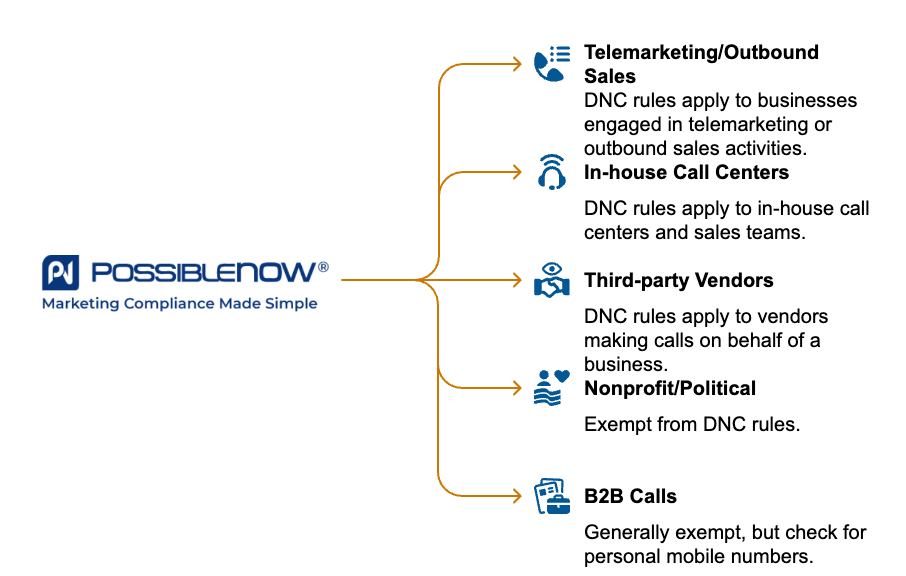Resource Center
How to Check If a Number Is on the Do Not Call Registry
Type: Blog
Topic: Do Not Call Solution

The National Do Not Call Registry was created by the Federal Trade Commission (FTC) to give consumers a way to opt out of unsolicited telemarketing calls. For businesses that rely on outbound calls to drive leads or follow up with prospects, checking numbers against the DNC Registry is a legal obligation. Non-compliance can lead to steep fines and serious reputational damage.
If your organization makes outbound calls, here’s what you need to know—and do—to remain compliant.
In the following sections, you’ll find information on:
- Steps for Businesses to Check Numbers Against the DNC Registry
- Key Considerations for DNC Compliance
- Who Needs to Check the DNC Registry?
- Why You Should Use an Automated DNC Solution
- About PossibleNOW
Speak With an Expert Today
Steps for Businesses to Check Numbers Against the DNC Registry
1. Obtain a Subscription Account Number (SAN)
To access the DNC Registry, your business must register with the FTC at their dedicated telemarketing portal. You’ll need to provide basic company information to receive a Subscription Account Number (SAN). This number is required for accessing and downloading DNC data.
2. Subscribe to Area Codes
Once you have a SAN, you must subscribe to specific area codes you plan to call. The first five area codes are free; additional ones require a fee. This subscription must be renewed every 12 months to maintain access.
3. Download and Scrub Your Call Lists
Use your SAN to access and download the DNC Registry for the area codes you’ve subscribed to. Then, compare or “scrub” your internal call lists against the downloaded data. Scrubbing must be done at least every 31 days to remain compliant with FTC requirements.
4. Utilize Third-Party Compliance Tools
While manual list checking is an option, it’s often inefficient and error-prone. Enterprise-grade platforms such as DNCSolution® streamline compliance by automating list scrubbing, flagging high-risk numbers, and identifying known TCPA litigators.
Key Considerations for DNC Compliance
- Internal DNC List Maintenance: In addition to the national registry, businesses must maintain their own internal DNC lists to record specific consumer opt-out requests.
- Wireless and Reassigned Number Risk: Calling reassigned mobile numbers can trigger compliance issues. Using tools that can help in validating number ownership [TJ1] helps mitigate this risk.
- Litigator Lists: Some individuals actively seek out violations to file lawsuits. Specialized tools can help flag and avoid these high-risk contacts.
- Established Business Relationships (EBR): Even if you have express written consent or an EBR, you must stop calling if the person opts out. Express written consent or an EBR does not override a subsequent direct request to stop contact.
- State Regulations: States like Florida and California may have their own DNC rules, including separate registries or narrower exemptions. Businesses must comply with both state and federal regulations.
- Record-Keeping: Maintain documentation of your compliance activities—such as scrub logs, opt-out confirmations, and consent records—to demonstrate due diligence.
Who Needs to Check the DNC Registry?

The DNC rules apply to a wide range of organizations, including:
- Businesses conducting telemarketing or outbound sales
- In-house call centers and sales teams
- Third-party vendors or contractors making calls on a business’s behalf
There are a few exemptions—nonprofits, political organizations, and most B2B calls are not subject to federal DNC restrictions. However, calls to personal mobile numbers or in mixed-use contexts may still fall under scrutiny.
Why You Should Use an Automated DNC Solution
Manual DNC compliance is time-consuming, labor-intensive, and prone to error, especially in high-volume environments. PossibleNOW’s automated Do Not Call solution offers several advantages:
- Real-time list scrubbing to keep your data current
- Audit logging and compliance tracking for defensibility
- Support for federal and state registries in a single system
- CRM and dialer integration to align compliance with your existing workflows
If your organization makes outbound calls, even occasionally, automating DNC compliance is one of the most effective ways to reduce legal exposure and improve operational efficiency.
Talk to us today to schedule a demo of DNCSolution® and find out how we can help protect your business.
Request a Demo Today
About PossibleNOW
PossibleNOW is the pioneer and leader in customer consent, preference, and regulatory compliance solutions. We leverage our MyPreferences technology, processes, and services to enable relevant, trusted, and compliant customer interactions. Our platform empowers the collection, centralization, and distribution of customer communication consent and preferences across the
enterprise. DNCSolution addresses Do Not Contact regulations such as TCPA, CAN-SPAM and CASL, allowing companies to adhere to DNC requirements, backed by our 100% compliance guarantee.
PossibleNOW’s strategic consultants take a holistic approach, leveraging years of experience when creating strategic roadmaps, planning technology deployments, and designing customer interfaces. PossibleNOW is purpose-built to help large, complex organizations improve customer experiences and loyalty while mitigating compliance risk.
-
TCPA Regulations and Compliance: Complete Guide
Type: Blog
Topic: Do Not Call Solution
-
Defining Meaningful Metrics: 6 Soft KPIs to Measure Customer Preference Collection
Type: Blog
Topic: Preference Mgmt
-
Email Preference Center Best Practices
Type: Blog
Topic: Preference Mgmt
-
The Basics of DNC Scrubbing: What Is a Do Not Call (DNC) Scrubber and Why Do You Need It?
Type: Blog
Topic: Do Not Call Solution
-
What is Consent Management, How it Works, & Why it’s Important for Data Compliance
Type: Blog
Topic: Consent Mgmt
-
Do Insurance Companies Cover TCPA Damages?
Type: Blog
Topic: Do Not Call Solution
-
8 Best Practices for Capturing GDPR Consent
Type: Webinars
-
Data Silos Cause Communication Gaps
Type: Videos
Topic: Preference Mgmt
-
Difference Between Preferences & Consent
Type: Videos
Topic: Preference Mgmt
-
Integrate Do Not Call Compliance with Preferences
Type: Videos
Topic: Preference Mgmt
-
Customer Preferences Require More Than One Flavor
Type: Videos
Topic: Preference Mgmt
-
Give Customers Opt-Down Options
Type: Videos
Topic: Preference Mgmt
-
Preference Center Organization
Type: Videos
Topic: Preference Mgmt
-
Strategic Consultants Benefited Scotiabank
Type: Videos
Topic: Industry Testimonials
-
Best Practices for Managing Do Not Email Lists
Type: Blog
Topic: Do Not Call Solution
-
How Do Not Call Rules Apply to Nonprofit Organizations
Type: Blog
Topic: Do Not Call Solution
-
How to Train Your Call Center on DNC Rules
Type: Blog
Topic: Do Not Call Solution
